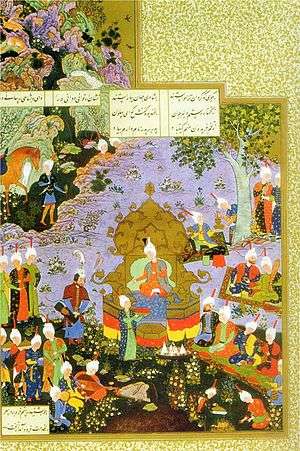Siamak
Siāmak (Persian: سيامک [sɪjɑˈmæk], sometimes transliterated as Siyamak or Siamac) is a character in Shahnameh, the national epic of Greater Iran.[1]
.png)
Ferdowsi's great epic poem begins with the story of Keyumars, the first king to arise among humans, who at that time lived in mountain caves and wore the skins of leopards. God (Hormazd) granted him the supernatural radiance called farr reserved for kings. His son was Siāmak and was beloved by all, except the destructive spirit Ahriman, who raised an army under the command of his own demonic son. When the divine figure Sorush warned Keyumars, Siāmak led an army of his own. Siāmak accepted a challenge to single combat and died at the hands of the demon.
Keyumars mourned for a year, and then Sorush advised him to fight Ahriman once more. Siāmak's son Hushang led the army that defeated Ahriman's son, whom he bound and beheaded.
Keyumars died after a thirty-year reign, leaving his throne to Hushang.
Etymology and meaning
In terms of etymology, it has been suggested that the word is a compound of siāh (Persian: سیاه, meaning black) + moo (Persian: مو, meaning hair) + -ak (suffix of endearment in Persian), hence giving the overall meaning of "beloved black-haired boy" or simply "possessor of black hair". Other meanings have been also suggested. These meanings include: "bringer of joy" and "great emperor".
References
- Ferdowsi, Abolqasem (2 March 2006). "Shahnameh: The Persian Book of Kings". Penguin – via Google Books.
External links
| Look up سیامک in Wiktionary, the free dictionary. |
- A king's book of kings: the Shah-nameh of Shah Tahmasp, an exhibition catalog from The Metropolitan Museum of Art (fully available online as PDF), which contains material on Siamak


.png)